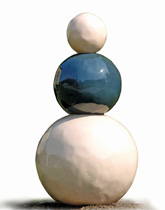
Sitting at a large folding table in a cluttered Baker Hall office at 2:30 in the morning, flanked by giant bookshelves full of tomes with titles like Discourse Ethics, Moral Imagination, and Contemporary Political Philosophy, Dan Giesey is quietly at work. He is photocopying, collating, and stapling page after page. Then begins the stuffing. He can barely squeeze the packets of information into the bulging manila envelopes.
The work is tedious and thankless and has been going on for weeks. Tomorrow will be the culmination. He will set up that same folding table, bearing printed Registration signs, outside of Baker Hall’s Giant Eagle Auditorium. There, he’ll greet a carefully selected sample of the Carnegie Mellon community—equal parts students, faculty, staff, and alumni—and hand them a crash course on public art policy.
The guests are there to discuss public art on campus, including questions concerning its role, acquisition, and prominence on campus. Giesey, a third-year ethics, history, and public policy major, doesn’t really care. “I’m fairly indifferent about the whole public art thing, to tell you the truth.” But he believes in the process.
Carnegie Mellon was among 11 universities in the country that received part of a $100,000 grant from the national honor society Phi Beta Kappa as part of a project called Deliberations about Things that Matter. Part of the money is being used to fund the campus conversation on public art. A handbook is also being prepared through which Carnegie Mellon can teach other schools about the deliberative democracy process. It’s not a town hall concept. It’s more like bringing the hall to the town by making sure all opinions are heard on a range of issues.
For Giesey, it’s a promising model, something to get excited about. But he also knows that democracy and civics, at their most basic, include a lot of grunt work. After the campus conversation’s introductory addresses, the participants separate into small groups—if they can’t find their way, he points them in the right direction. Once situated, they join in facilitated but lively and productive discussions.
Before the night ends, everybody reconvenes in the auditorium. Giesey trots around the auditorium with a microphone as he lets them quiz a panel of experts. Finally, Giesey and a small cadre of other volunteers gather exit surveys filled with now-informed opinions.
After it’s all over, Giesey and another volunteer head to the nearby Panther Hollow Inn, split a pitcher of Yuengling, and good-naturedly debate political philosophy. It’s a debate not meant to have definitive conclusions, just like the campus conversation. The next day, he’ll begin tabulating the surveys and preparing a final report—more long nights in Baker.



